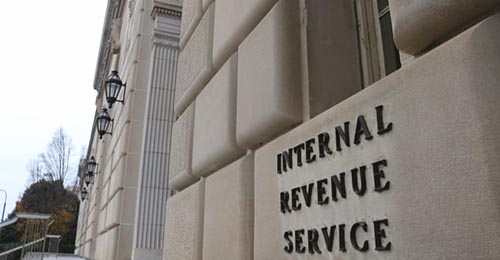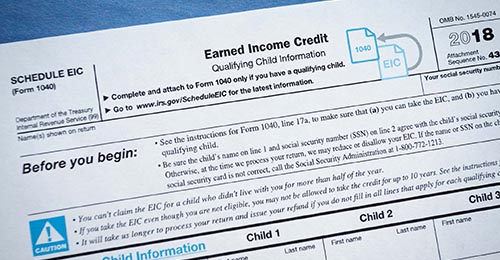Here’s What Could Happen If You Try to Short-Change the IRS

A Novel Way to Make COVID-19 Relief Donations
July 21, 2020Tracking Mileage in QuickBooks Online
August 4, 2020Article Highlights:
- Self-employed taxpayers
- Underreported income
- Unscrupulous tax preparers
- Phony deductions or credits
- Inflating the Earned Income Tax Credit
- Taking fake education credits
- Petty cheating
Some refer to it as “creative accounting” or just “a little fudging here and there,” but if your tax return is missing some income that should have been reported or includes overstated deductions, regardless of whether you prepared your own return or had it prepared, you are the one who is ultimately responsible. If you get caught, there can be very unpleasant consequences – including substantial monetary penalties and the possibility of jail time for blatant cases.
Those who fudge on their taxes may think that they are just cheating the government out of money. In actuality, however, the government is going to get the taxes it needs from somewhere, so those who fudge on their taxes are causing others to pay more.
Currently, just short of 50% of all U.S. taxpayers pay no income tax. In fact, a large percentage of these folks actually get money back from the government because their income is low and they qualify for certain refundable tax credits. How many of those not paying any tax are doing so because they are either not reporting all of their income or exaggerating their deductions? There are no statistics on the issue, but it would seem to be a large number.
One of the biggest areas of cheating involves self-employed individuals not reporting cash payments. Some will even go so far as to offer discounts for cash payments; these discounts, of course, are attractive, and customers often opt for them, thus enabling the self-employed individuals to cheat on their taxes. However, if self-employed individuals get caught – perhaps because their lifestyles aren’t supported by their reported income – they can end up with a nasty tax bill and penalties. Plus, when the IRS finds a cheater, it usually audits that person’s or company’s returns for other years.
Especially troubling is knowing that some individuals who underreport their income are not just avoiding income taxes, but qualifying for low-income tax credits and other subsidies meant for those who really need them.
Unscrupulous tax preparers also cheat, and you could end up being the victim. Here are some of the schemes they pull:
- Adding phony deductions or credits – They do your return correctly and tell you what your refund is. Then, before they e-file it, the preparer adds phony deductions or credits to inflate the refund. The refund amount you expect is direct-deposited to your account, but the extra amount is sent to their bank account.
- Inflating the Earned Income Tax Credit – Earned Income Tax Credit (EITC) is a refundable tax credit for low-income taxpayers that is based upon the amount of the taxpayer’s income from working (earned income). The credit increases up to a point as the taxpayer’s earned income increases, then phases out for higher-income taxpayers. This credit is the frequent target of scams, and one of the most common is to create earned income by fabricating self-employment income of an amount that will result in the maximum EITC. Even though this may create more taxes, the EITC is greater than the taxes, netting an increase in the taxpayer’s refund.
- Taking fake education credits – Another frequent scam is to claim a higher education tax credit, especially the partially refundable American Opportunity Tax Credit (AOTC), using made-up education expenses. The AOTC can be as much as $2,500, and $1,000 of that amount is refundable.
If you were a victim of an unscrupulous tax preparer and need assistance, please call this office.
Petty cheating is also prevalent. The following lists common areas of cheating and the steps that the IRS takes to counter them.
- Inflating the value of noncash goods donated to charity – This is probably one
of the most commonly inflated tax deductions.
IRS Countermeasures: The IRS requires documentation from the charity, and if the value of the donation is more than $500 for the year, a detailed list of the items that the taxpayer contributed. The IRS will generally include charitable contributions in every audit, no matter what triggered the audit in the first place. - Claiming fictitious cash contributions – This typically
involves claiming that cash was donated through a house of worship’s collection
plate or holiday charity kettle.
IRS Countermeasures: All cash contributions must be verified with a bank record or a written record from the charity. Without such a record, no deduction is allowed. - Purchasing an item at a charity event – Generally, when
you receive something of value for making a donation, the value of that item is
not a deductible charitable contribution. Thus, the cost of pancake breakfasts,
charity auctions, Girl Scout cookies, car washes, and the like are not
deductible as charitable contributions.
IRS Countermeasures: The IRS requires charities to include the value of goods or services provided to the donor on the charity’s receipt, making it easy for the IRS to detect when improper deductions are being taken when it examines the receipts during an audit. - Donating cars to charity – At one time,
individuals were donating vehicles that were close to being scrapped and then deducting
the blue book value for the vehicle as if it were in good or better condition.
This trend became so prevalent that Congress actually stepped in and limited
the vehicle contribution to $500 (generally).
IRS Countermeasures: The IRS now requires the charity to issue a Form 1098-C to the donor; this form includes the information that needs to be reported if the vehicle contribution meets the requirements for a contribution greater than $500. - Using a business vehicle for personal purposes – Have you seen pickups
and other trucks with company logos on their doors towing boats and trailers
down the highway? There is a good chance that the drivers of these trucks are writing
off the mileage through their businesses.
IRS Countermeasures: The IRS generally requires businesses, especially closely held ones, to verify the business use of their vehicles (particularly those that are suitable for personal use) with a log, including the odometer readings for the start and finish of each business use. - Deducting more home mortgage interest than entitled
– Tax
law limits the amount that can be deducted for home mortgage interest to the
interest paid on $1 million in debt ($750,000 for debt incurred after December
15, 2017) from purchasing or improving a home. This limit applies to a taxpayer’s
first and second homes only. Many taxpayers simply take the mortgage interest from
the Form 1098 provided by the lender without any regard to these limitations.
IRS Countermeasures: IRS Form 1098 requires lenders to include additional information that will allow the IRS computer to determine whether the limits have been exceeded. - Making repairs on a personal home and deducting the
expenses on a rental or business property – It is pretty easy for landlords or
owners of business real estate to make repairs on their personal homes and then
deduct those repairs on their rental or business properties.
IRS Countermeasures: An auditor will look at the dates and addresses on receipts to ensure that they make sense. If an auditor catches such a violation, expect him or her to become very aggressive in other areas and to possibly invoke substantial penalties due to the intentional disregard of laws and regulations. - Falsifying investment costs to minimize gain – Until a few years ago, it was up to taxpayers to track their basis in the securities they owned. Inflating the cost was prevalent before the IRS required brokers to begin tracking basis. IRS Countermeasures: The IRS modified Form 1099-B, issued by brokers when stocks, bonds, etc., are sold, to include the basis if known, and to indicate otherwise if basis was unknown. Then, the IRS developed Form 8949 to separate investment sales into those for which the broker was tracking the basis and those for which the broker did not know the basis or wasn’t required to track the basis. The information included on these forms allows the IRS to focus on those sales for which the taxpayer was tracking the basis.
If you have an acquaintance who has been less than honest on their tax returns in the past or has been the victim of a dishonest or inept tax preparer, please have them give this office a call.




